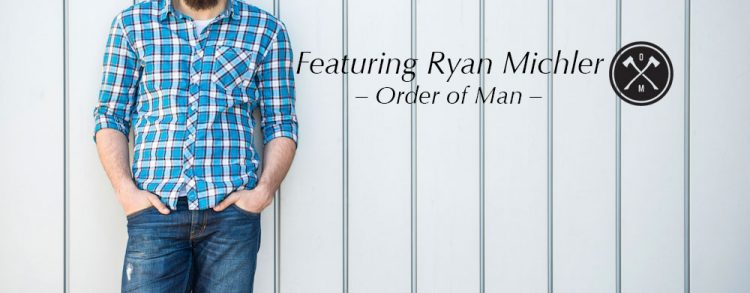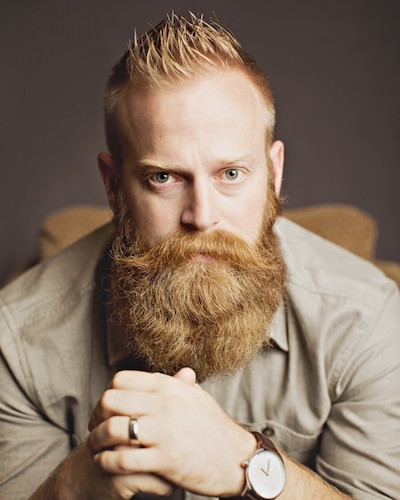Podcast: Rise Above and Take Action with Ryan Michler

 I have an amazing show for you today. [remember to Subscribe Here] I’m joined by a man I can now call a friend, and one that makes our roles as men better because he’s here to help us make smart moves and go boldly into that good night.
I have an amazing show for you today. [remember to Subscribe Here] I’m joined by a man I can now call a friend, and one that makes our roles as men better because he’s here to help us make smart moves and go boldly into that good night.
My guest today is Ryan Michler of ORDER OF MAN. Through his site, podcast, and personal missions, Ryan is driven to take back what it means to be a man, and he wants us all to learn together – from the best men the world has to offer. From interviews like this one, to personal stories of struggle and success, everyone in the Order of Man takes with him a piece of the lessons to apply in his life.
He grew up without a permanent father figure in his life, missing out on some of the wholesome ‘fatherly” moments you might see on TV – playing catch, working on a car together, building a treehouse, etc.
He and I share the same sentiment that there is, in fact, a difference between being a male and being a man, and we’re both working to help make men better. As a father, he takes his commitments and agreements to heart, and works to build solid foundations and principles with and for his kids.
Ryan and I got the chance to meet and trade stories in person in mid-March at StyleCon 2016 in Atlanta, and I knew I wanted to share his wisdom with you, my listeners.
Definitely make your way to orderofman.com and discover more about his mission, his story, and his wisdom, including the Iron Council – a division dedicated to helping men develop deeper, more meaning full relationships with their spouses, families, and themselves. It’s about setting fire to the possibilities around you.
Okay, quick note on the audio here, guys. The first 2 minutes of audio is completely unusable so that’s why it’s missing. The internet can be a fickle beast sometimes and the audio was so choppy through Skype, it has to be thrown out.
Let’s open the interview by jumping right into Ryan’s story and his take on what he sees going on in society – and WHY he started Order of Man.
Show Notes / Interview
Ryan Michler [RM]: They’re letting their businesses fall into the ground. they’re even running their businesses at the expense of other people. they’re not participating in their communities. So what I’m saying is stop. we have to reverse this trend, we have to go back the other way because this is what society needs as a whole is men to be strong men, strong leaders, and be present for all those areas for all of those areas in their life.
Blake Hammerton [BH]: My father was around physically, but was more of a boss than a dad. He wasn’t necessarily a bad guy at all, but it taught me a lot about relationships and connecting. I remember being a teenager and thinking about the kind of man I was going to be – the kind of dad I was going to be, and measuring things against my experience with my father. You know, these are the things I’m NOT going to do, and the examples I’m NOT going to set for my kids and all that. Although we’re in different upbringings, we share a similar thread on that one.
RM: Well and I think that the reality is that I have this conversation every single day with men across the planet. I’m noticing that this is a very common theme and just like you, it’s not necessarily physically present, but it might be emotionally – they’re not present. So yeah, it’s important work. It really is valuable, but what I’ve come to realize is that men that are worth their weight are those that ware willing to take action. There’s a lot of opportunity that people have and ideas out there. I’ve never met a man who didn’t have a vision or idea for what he wants his future to look like, but the guys that actually take action and do something about it are few and far between. I didn’t want to be that guy.
I didn’t want to be the guy on the sidelines that let life pass him by and let life be the way it is, I wanted to actively engage and take action and that’s why we started the brand and Order of Man that we have now.
BH: Do you feel the taking acton part of you and your life and abilities came from your military background or was it always instilled in you to just come up with an idea, take a deep breath, and move forward?
RM: That’s a good question. Like I said, my father wasn’t around, but my mother was present and being a single mother, there really wasn’t a choice for her – the HAD to take action. There were times she was working multiple jobs at the elementary school and while I was in high school she was working in a pizza place so I remember her working multiple jobs.
I’ve never really thought about where it’s come from, but if I have a blessing and a curse – and that’s typically how it is, your blessing is your curse, it’s my ability to execute on an idea and at time that’s gotten me into trouble because I move forward too quickly and end up wasting time because did it wrong or incorrectly, or wasting money because I rushed in too quickly, but I would rather make a mistake by moving forward than make a mistake by letting life pass me by.
BH: I’m in a similar boat as well, and I’m sure some of my listeners are too. We come up with this great idea or this spark and we’re going to do something really cool with it, and we move almost carelessly into and through it that we don’t so much waste time or money as much as we seem to take on casualties in our relationships with our actions. I know I can get fired up and push into an idea full force and just bulldoze into people and things with it. Do you find the same in your efforts?
RM: Oh yeah, absolutely. Ask my wife! Ask my kids! This is something I’m passionately involved with, my work here, but that doesn’t mean I’m immune to what a driver or type-A personality is all about. It’s a “take action, get things done, no excuses, no fluff, cut the B.S. and get right to it” style and it’s something I need to very conscious of and be aware of. The best thing I’ve been able to do to overcome this hurdle – because I don’t have it all figured out – but the best I’ve found is to create boundaries.Understand when I’m working, understand when I’m home, and give my undivided attention to each.
I have to honor those boundaries though. When I’m working, my kids and family know I’m not open to playing and hanging out. But when the day is through and I’m not working anymore, I have to shut down, shut off the phone, shut off work and honor the time I committed to those kids – that I would be fully present because that’s what I said I would do, and that’s what they need from us.
BH: I love your videos and like to watch them to not only see what you’re sharing, but also the comments that will come from them. In a recent video you spoke about the definition of being a man and you mentioned agreements. One of my favorite things to preach is the agreements we make with ourselves and the world at large, and I love that you touched on that. A man is accountable and responsible to his commitments and the things he agreed to, and that really resonated over here…
RM: You know, I’m actually working on a presentation right now for an event next week, and I probably shouldn’t have accepted it. But I’m doing it because I said I would. When you commit to do something and you follow through, whether you want to or don’t want to, it actually teaches you how to handle your business in the future. Now I know, as I am preparing this presentation, a little more about what I should and should not be accepting, but if there’s no consequence for your action or decision or your commitment or word, then you’re never going to learn anything. You’re going to commit to everything and you’re going to do nothing. You’ve got to be a man of your word because it’s a good principle to follow, it builds trust and credibility in the eyes of others, and it also teaches you how to be a better human being.
BH: And you know what, it teaches you to know your own limitations when you bite of more than you can chew. It’s a crash course in operating outside of your comfort zone.
RM: Typically, I’ve found we can handle more than we think we can. We have a natural tendency to hold ourselves back or keep ourselves back or take it easy because we have these scripts in our minds that tell us we have to be comfortable and safe and secure and avoid frustration and pain and heartache – all these uncomfortable situations. I really subscribe to what Teddy Roosevelt describes as the strenuous life: mentally tough, physically and emotionally tough, and prepared for challenges – the stronger we can be in those areas, and the more challenges, obstacles, and hurdles we can present ourselves, the stronger we become and the more resilient we become when we’re facing something of a serious nature.
BH: Well that brings up another point – some say the modern man is softening, some say he’s becoming more self-aware – where do you see the modern man these day? Where are we, as men, going?
RM: I think there’s certainly some self-awareness in certain tribes – it’s hard to say collectively that any one group is behaving a certain way, but I believe that we are getting weaker and softer. I think part of that comes from the fact that technology and some of the advances that have helped us be more effective and efficient has made us irrelevant as participants. Thousands of years ago we had to make our own tools and forge our own way. Nowadays, technology does a lot of the hard work for us.
And it’s not like there’s an attack or an assault on masculinity, it just happens by happenstance. We need to go back to our roots and make things a little bit harder. That means we physically and mentally exert ourselves more so we can be resilient. We’re not learning these strategies to be resilient and it’s causing some serious problems. I’ve spoken with boys graduating high school that have anxiety about leaving their parents’ home. I remember being at that age – 18 years old and I couldn’t wait to be out of my parents’ house. It wasn’t like I had a bad experience, I was just ready! My mother did a great job preparing me to get out on my own, to be strong on my own, to be sustaining on my own, and it’s just not happening anymore.
We’re weakening and we’re relying on others to accomplish the things that we want and then we wonder, in the same breath, why we’re not accomplishing what we want and why we’re not satisfied or fulfilled, and it’s because we don’t have any challenges!
BH: You touched on something earlier on in our conversation about technology being great tools for us as we move forward. It feels like we’re using them for evil and not good – communicating through them without consideration of people or interaction or feeling –
RM: Well, it’s not even really about feeling. It’s that we’re lacking any real consequence for the things we say and do. If I sit here and back on your show and that guest, Ryan Michler, you had on your podcast, what’s the consequence of me doing that? Nothing, really. But if I talk that way to a friend or family member, I’m going to lose that relationship, so there needs to be consequences for our choices. We see no there’s a lack of personal accountability, a lack of responsibility, but if we return to there being consequences for your good actions and your not good actions, and you’re accountable for what you’ve said and done, I think the world’s going to be a better place.
BH: I agree with this lack of accountability and consequence for actions, my friend. Changing gears though, what kind of strengths do you feel the modern man has now, that he didn’t have 50 years ago? What are some good things we have going for us?
RM: Oh man, the tools that we have to make us more efficient and effective. If we learn to use the tools that we have to make us better, we are on the right track. Our access to information, for example, is unlike it’s ever been in the history of the world. We have instant access to almost any piece of information out there. If you made a suggestion for a book to read, I could literally start reading that book in the next 60 seconds. It’s crazy and it’s awesome, and it’s powerful, but we should be utilizing it in the right ways, and not let it control us.
One of the other issues we have with this new instant information is paralysis by analysis. I made read all these articles or a book but I don’t take any action because I’m wondering if Joe is right or John is right – I can’t discern which opinion I should follow. At the end of the day, real men are men of action. They implement the knowledge and that’s the difference between knowledge and wisdom: it’s the ability to discern what to implement and start taking action.
BH: With all the different pieces of advice and insight you hear in your travels and clients, I’m sure you hear some pretty bad advice given out. In your opinion, what’s one piece of advice you’d like to see laid to rest today?
RM: I’m not sure it’s it’s technically bad advice, but one thing I hear a lot that’s almost “common knowledge“ is this idea of following your passion. I think that can be very damaging because what it can lead some people to believe is there’s some magic pill or job or career out there, and once you find it the world will be perfect. As much as I’m excited about the work that I’m doing now, there are still days when I’m pissed off and I just don’t want to do whatever it is I need to. And if I subscribe to the passion principle in my mind it means I need to quit my job and go find something that’s more engaging to me because I happen to have one bad day or had to participate in one task I didn’t enjoy doing all that much.
I think you need to take that concept for “find your passion” with a grain of salt because I think you can create the life, relationships, the health, and wealth you want to have. We have the ability to create that passion and don’t need to go out there and find it somewhere else.
BH: So what’s one piece of good advice you’d like to keep alive in the world today?
RM: You know, the best piece of advice that I could give and that I’ve taken in my life is to maintain consistency. Any time I maintain consistency through rain or shine, good days or bad, whether I want to or not, my results exponentially increase. It applies in going to the gym, it applies in business, health, marketing – do it even if – especially if you don’t want to do it. That’s probably when it will count the most.
BH: Right on. So what would you say is one or two of your personal secrets to keep yourself on track and consistent with your commitments?
RM: I guess it would be a couple of things. One, for me, is planning big goals months in advance, almost forcing me to get there. For example, I signed up for the Spartan Agoge in June with Joe De Sena. It’s 60 hours of grueling and intense challenges, but it gives me something to plan for. I committed to it, there are nine other guys going with me, I’ve paid for it – so when I think about it, I know I have to work every day to prepare for it.
The second thing is tracking – track everything. I think what happens is a lot of men go about life and they don’t track what they want, what they don’t want, they don’t track their progress, and then they wonder why they’re not satisfied or why they’re not seeing any results. Well, they’re not tracking anything so there are no results to even see.
We do the same thing when it comes to finances. I’m a financial advisor by trade and we tell people you have to track your income and track your expenses. I can see that you live within your means, but are you actually tracking where it’s going? What’s really interesting about this is if you look at somebody’s budget over 30 or 60 or 90 days, you can see where their priorities lie, but the reality is most people aren’t really clear about what it is. You track what you’re doing because it will tell you what’s really important to you.
BH: Indeed. I can tell you to your face what I think is important to me, but you can check my expenses and tell me something entirely different. I simply won’t divulge how important Chipotle is to me, but my bank account will sing that tune for you…
RM: Exactly. What it comes down to is personal responsibility and accountability for your life and actions, and part of that comes from creating systems that won’t let you fail. If you follow these systems, you will not fail. I’ll give you an example of this: about 3 years ago I was really out of shape – I was 50 lbs overweight and unhealthy and I wasn’t able to really do things with my family. I always had this goal of losing 20 or 30 or 50 lbs, and I was so focused on the outcome of it, that nothing ever happened.
Then something switched. I don’t know whether I read something or heard something, but I started looking at the actions that would guarantee my results. What actions can I take today that will guarantee my results down the road? Every day it comes down to eating a little bit better, and exercising a little bit more. I know there is more to it, but that’s the simple version. Once I focused on the actions I could take every day, the weight went away. I achieved my result. So don’t focus so much on the results. Focus more on the actions that will guarantee the results.
BH: Excellent advice. I could not agree more. So what’s one thing you’d like to leave with the listeners/readers to help them move forward and make it happen?
RM: I think the biggest thing is to take action. We come back to this idea of planning and strategy, and making things perfect, and let’s get it right, and do market research – and while there’s merit to all of those things, the real work starts when you start putting in the work and when you start taking action. It doesn’t have to be perfect, it doesn’t have to be elaborate, it doesn’t even have to be right – it just has to be action. You may want to improve your health or your relationships so you read a lot and learn a lot and hear a lot of the ideas and opinions out there to help you, but when’s the last time you got up and did something about it? When’s the last time to took action to improve? That’s the message I want to leave: take more action, always.
What do you think of the interview? Are there any questions you have for us?
What would you like to hear more of? Share them in the comments below so we can connect.
Remember to SUBSCRIBE to the podcast!




